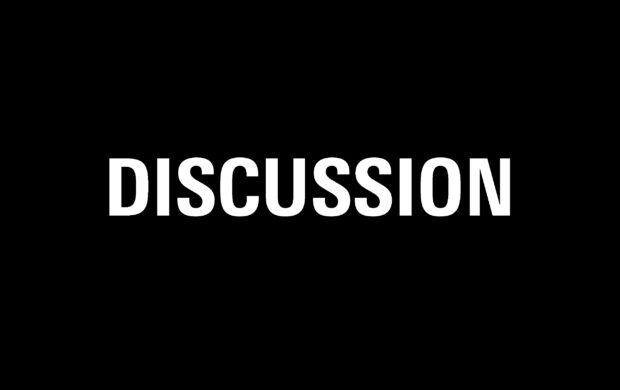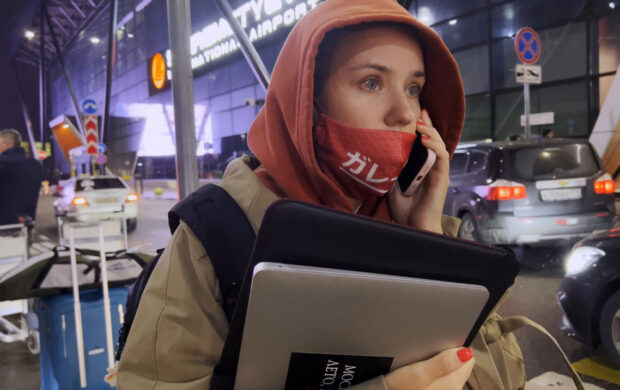
Julia Loktev: Counterinformation
Lire la suiteAnya, a presenter for the independent TV channel Rain, is the first woman we meet. Often filmed at the wheel of her car, her face soon becomes the projective canvas for both the story and the changing lights of Moscow, from the pale white of early morning, to the golden hues of streetlamps at night, to the crimson of fireworks in Red Square that celebrate the start of the invasion of Ukraine. “Your face is so beautiful right now,” Anya says to the filmmaker abruptly, as the car is stuck at a red light. The faces of all of these women are reflected in each other – up to and including the off-screen face of Julia Loktev. We can’t help but think that the director is the foreign agent, the one who has led a parallel existence to that of her friends, but is now the only one able to document the collapse of Russian civil society and journalism.
Another more discreet tragedy lurks in the images of My Undesirable Friends, emanating from the screens that feature so prominently in Loktev’s shots and her friends’ activities. In the palms of their hands, the film’s activists and journalists hold what might appear to be a small piece of liberal democracy, or at least a means of expression independent of the regime. They all use iPhones, constantly filming and keeping each other informed as events unfold. The progressive Rain channel, where Anya works, broadcasts mainly on YouTube which, she explains, is where part of the outlet’s income comes from. Emails are exchanged over Gmail, and Snapchat and Instagram are referenced… So many applications and communication channels whose facade of progressivism suddenly slipped this January, in service of total adherence to the reactionary policies of the first couple (Trump and Musk).
Mark Zuckerberg, head of the Meta group – which includes Facebook and Instagram – said he wanted to reintroduce a certain “masculine energy” that had come to be lacking within the company, as inclusion policies were put into practice. In the offices of Google – which is owned by YouTube – rainbow flags have vanished along with DEI (diversity, equity and inclusion) programs. This represents a general tendency (see also: Disney and Amazon) that the broadcast of Donald Trump’s inauguration showed up for what it was: an American-style oligarchy that stands shoulder-to-shoulder with a far-right president. We have seen tech lords embrace Trumpism, and Trump insult Volodymyr Zelensky with Putin’s words before concluding: “This is going to be great television”.
There’s something doubly tragic, therefore, in watching today’s activists of sound and vision place so much hope in the production of images destined to travel the information highways, just a few years before their direction changed with the wind.
What is striking about these women, however, is their inextinguishable capacity for indignation. Every scandal, every injustice – the closure of the international human rights organisation Memorial, Russia’s exit from the Council of Europe, the daily censorship, the imprisonment of a comrade – is the subject of serious conversation, peppered with some much-needed jokes. Loktev’s undesirable friends force laughs, lots of them, cry very little, and work constantly to keep the truth alive.
A moral compass – one they have improbably borrowed from Harry Potter – regularly guides their steps (although references to The Lord of the Rings also occur when, for example, Lena tells her partner who has come to join her in Moscow from America: “Welcome to Mordor!”). As the situation grows increasingly desperate, and when it becomes apparent that exile is their only recourse, references to the famous saga became more and more frequent. The invasion of Ukraine is compared to the fall of the Ministry of Magic (Deathly Hallows), Navalny is likened to Harry (whom he is said to have quoted at his trials) and, logically enough, Putin is none other than Voldemort, with whom – as Ksyusha remarks shortly before the police enter Rain’s studios – he shares a certain physical resemblance.
A few belongings thrown into a suitcase, a plane ticket to Istanbul bought in a rush: the film is suddenly depopulated by its characters, who leave their country one after the other. The first images of the invasion of Ukraine are still fresh in our minds, but those of Russia’s tipping over into martial law are still rare. Julia Loktev is there, in the midst of the tumult that the edit of My Undesirable Friends aims to render at the end of the film, by imitating the editing of the programs broadcast by Rain in its final moments. Which images, which narratives, remain when the faces the series has accustomed us to seeing and hearing have left the frame for a distant off-screen? A title card at the end promises a second part to the series, soberly entitled Exile.
Occitane Lacurie
Occitane Lacurie is a critic for Débordements magazine and a doctoral student in Film Studies.
